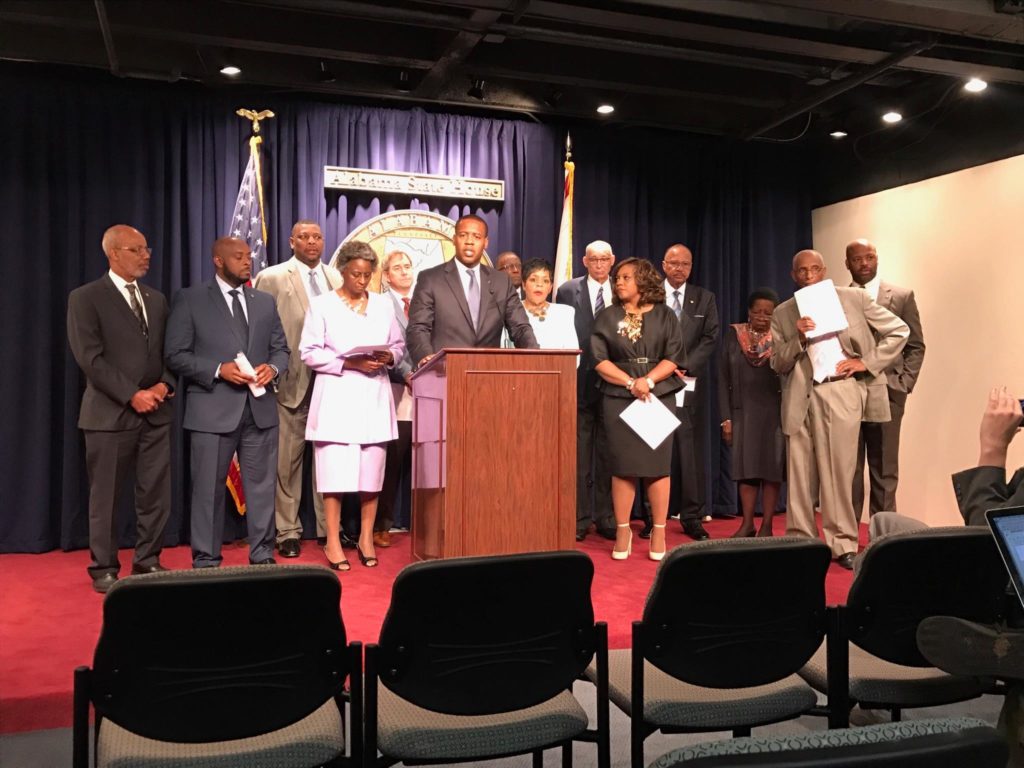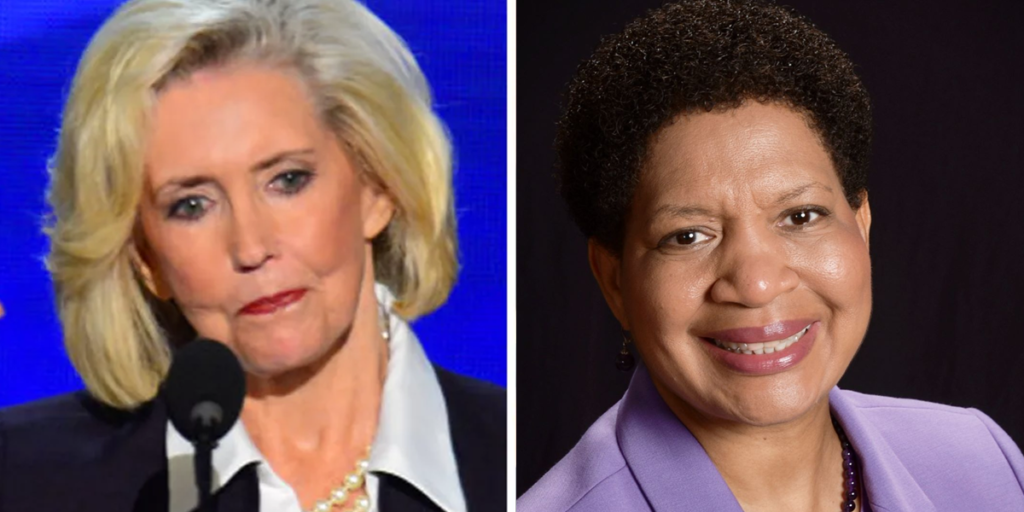Special session to be held next month

The U.S. Supreme Court surprised many court observers earlier this month when it ruled that Alabama’s congressional redistricting passed in 2021 violated the Voting Rights Act of 1965. The special session to address the redistricting will be next month. 2024 is a presidential election, and the Alabama major party primaries will be early in that cycle on March 5. This means that campaign qualifying with the major parties will begin in November. The three-judge panel of the Eleventh Circuit Court of Appeals in Atlanta has ordered the state to present a redistricting plan acceptable to the court, or the court will appoint a special master to do it. State Representative Mack Butler (R-Rainbow City) told Alabama Today that he heard the special session would be on July 17. Butler said the special session would narrowly focus on passing a new congressional redistricting plan. Rep. Ron Bolton (R-Northport) addressed BamaCarry of Tuscaloosa County on Monday night. “The special session will be on July 17,” Bolton said. “It will be an agreed-upon bill.” Bolton said that the three-judge panel in Atlanta had set the deadline for the state to submit a compliant redistricting plan as July 21. Rep. Ed Oliver (R-Dadeville) told Alabama Today that the special session should include legislation on the ballot harvesting ban bill that failed in the last session. “That’s the Secretary of State’s bill,” Oliver said. “With two contested congressional races, we need that to ensure that the election is secure.” The federal court ruled that since Alabama is nearly 28% Black, the state should have two congressional districts that are either majority Black or are close to it. Currently, the Seventh Congressional District, comprised of a 55% Black voting population, is Alabama’s only majority-minority district. The other six congressional districts are all less than 30% Black and are all represented by White Republican men. The Seventh Congressional District is represented by Rep. Terri Sewell – the only Black person in the congressional delegation and the only Democrat. Since all seven congressional districts have to be roughly equivalent in size, changing the districts so that two have roughly 48% or more minority voters will mean that all seven districts will change in redistricting. Whereas the Legislature before sought to keep all seven of the incumbents in their districts, that won’t be a consideration in the next redistricting plan, so it is likely that some incumbents could be redistricted into the same districts. Alabama Republican Party Chairman John Wahl has said the Alabama GOP will contest all seven congressional districts in 2024 – including Rep. Sewell’s. Rep. Oliver said that in that hyper-competitive environment, it is important to have as secure an election as possible, and that is why the call should include the ban on ballot harvesting. House Bill 209 (HB209) passed the House of Representatives in the recent regular session, but the Alabama Senate failed to address it. Ballot harvesting involves paying political operatives to collect absentee ballots. “Over the last decade, there have been multiple convictions for absentee ballot fraud across the state of Alabama,” wrote Secretary of State Wes Allen. “As a Probate Judge, a legislator, and now as Secretary of State, I am committed to eliminating election fraud in our state. HB209, sponsored by Rep. Jamie Kiel, makes incredible strides in protecting the rights of Alabama voters to cast their own votes without undue influence. Currently, it is legal for groups operating as non-profits to offer payments in exchange for absentee ballot applications to Alabama registered voters. HB209 would end that. Today, it is legal for out-of-state organizations to mail pre-filled absentee ballot applications to unsuspecting voters across the state, some of whom have moved or have no intention of voting absentee. HB209 would prohibit this practice.” “HB209 would make it illegal to pay or to be paid by a third party to collect absentee ballot applications or absentee ballots from Alabama voters,” Allen continued. “Furthermore, it would eliminate the ability of organizations to sow the seeds of chaos and confusion by sending pre-filled absentee applications into our state. Our elections are the foundation of our constitutional republic, and nobody should be paid for their absentee application or their ballot. Ballot harvesting should not be a job description.” Democrats, who opposed the bill, called it “voter suppression” and said that it would make it illegal for neighbors to help neighbors fill out their absentee ballot. HB209, as amended in the House, would allow family members to help family members prepare their absentee ballot. “House Bill 209 states that the Secretary of State, probate judges, absentee ballot election managers or their designee,” Rep. Adline Clarke (D-Mobile) said. “Now, it is absolutely unrealistic to believe that these individuals can take up the slack for the hundreds of volunteers that assist voters in every election. It is not humanly possible and will cause a huge decrease in the number of voters who vote absentee. That is a sad thought.” Whether or not the ballot harvesting bill is included in the call for the special session is solely the purview of Gov. Kay Ivey. “I have a wish list, I am sure you have a wish list, but that is up to the Governor,” Sen. Dan Roberts (R-Mountain Brook) told Alabama Today. Roberts warned that including Allen’s legislation in the special session would be “divisive.” Roberts was also skeptical of rumors that a proposed constitutional amendment addressing gambling could be in the call. “I had not heard that,” Rep. Butler said when asked about the gambling bill rumor. “I think it is going to be a simple one-issue special session.” “In all of the communications that I have had with Speaker (Nathaniel) Ledbetter, he has not given me any indication to think that is being considered,” Oliver said of the gambling rumor. Butler said that with two highly contested congressional races on the ballot in 2024, “We are going to need every Republican to turn out.” To connect with the author of this story or to comment, email brandonmreporter@gmail.com.
Alabama House Democratic Caucus calls for an agenda that is ‘pro-growth, pro-innovation, and pro-Alabama’

The Alabama House Democratic Caucus released its legislative agenda on Wednesday after Gov. Kay Ivey’s State of the State address. The Caucus said that their agenda was “pro-growth, pro-innovation, and pro-Alabama.” Rep. Anthony Daniels opened the conference, stating that “we all win” when Alabama focuses on those goals, arguing that the group aims to “move Alabama forward.” Daniels argued that it’s time for Alabama to “rebuild and recover” and not focus on issues that will divide the state. The caucus also called upon Republicans, who enjoy a supermajority status in the Legislature, to spend federal relief funds on health care, and asked leadership to encourage “sustainable, long-term economic growth.” Policy director Adline Clarke called on a tax cut on small businesses, stating, “We vehemently opposed the majority’s efforts to defy and replace federal vaccination mandates with conflicting state mandates. This has now, essentially, resulted in the largest tax, or burdens, on small businesses in the history of Alabama.” The caucus also renewed calls to expand Medicaid under the Affordable Care Act and called to repeal the state’s 4 percent tax on groceries. Additionally, they want to expand early voting, and call on the state to provide pay raises to teachers and retired educators. AL.com reported that Daniels urged lawmakers to be mindful of any grant programs they authorized with the federal funds. He said that local matching funds, while often available in cities with strong revenue bases, are not often a solution in cities where budgets were hit hard during the pandemic. “There are communities across the state of Alabama not collecting revenue at the level they had been in the past. We need to look at this problem holistically so communities have a fair shot across the board and not just communities that can afford it,” Daniels commented. Rep. Pebblin Warren discussed using funds to incentivize doctors to relocate to Alabama, noting a shortage in healthcare workers. “We know a healthy Alabama is a basic foundation for our wellness. Simply put, there has never been a more important time to expand Medicaid. We need to do everything we can to ensure access to affordable and quality health care.” Daniels also spoke about the GOP and the agenda that focuses on issues that he argued as not important, like Critical Race Theory and Republicans’ call to remove the requirement to purchase a permit to possess a concealed handgun. Daniels argued that the conceal carry measure has been opposed by sheriffs. “It hurts our public safety,” Daniels stated. “This is an issue that we are on the side of law enforcement on, and we are working alongside all of the citizens of Alabama because it’s dangerous.” “They’ve referenced Birmingham in one of the articles that I read, but they failed to say one word about January 6th,” Daniels said. Daniels reflected on the lives lost to COVID-19 and the prison system, stating those are more important issues. “We are focusing on things that continue to divide us as a state. Those days should be gone.”
Equal pay activist Lilly Ledbetter endorses State Rep. Adline Clarke

Alabama State Rep. Adline Clarke has won the endorsement of the woman who became the face of the women’s equal pay movement in Congress. Lilly Ledbetter, the Alabama-native and namesake of former President Barack Obama‘s first piece of legislation signed into law back in 2009, endorsed the Alabama House of Representatives District 97 representative on Tuesday ahead of the upcoming election. “Adline is leading the fight for women and our families in Montgomery,” Ledbetter said of her endorsement. “She has a proven record on the issues that most impact our families and future and I am proud to support her.” Clarke said she’s honored to have Ledbetter’s support “I am so incredibly honored to have the support of Lilly Ledbetter,” said Clarke. “Her work on behalf of women and all citizens has had a tremendous impact on me and so many others. I look forward to working with her again during the next session to finally pass a long overdue Equal Pay bill here in Alabama.” Clarke’s fight for pay equality In the State House, Clarke has led the fight for Equal Pay legislation and has been an important voice on issues including ensuring Alabamians have access to well paying jobs, well-funded schools and quality affordable healthcare. In March, she introduced HB368. The bill would prohibit employers from paying their employees less than the wage they would pay a member of the opposite sex for a similar job or responsibilities when viewed as a composite of skill, effort, and responsibility, as specified. Alabama is one of only two states, along with Mississippi, without an equal pay law. “Nearly every state has a law prohibiting employers differently based solely on gender. I’m disappointed. I would have thought we would have passed a long long before now,” Clarke told AL.com in March.“Timing is everything.” Ultimately, Clarke’s bill, which mirrored federal law but tasked the Alabama Department of Labor with enforcement, failed. “Clarke is definitely planning to introduce it again and given the bipartisan coalition in support which she built last session (27 sponsors and cosponsors men and women, Democrats and Republicans),” said Marion Steinfels on behalf of Rep. Clarke. “She feels confident we will finally pass it here.” Clarke faces Republican candidate Stephen McNair on Nov. 6.
Alabama is 2018’s third worst state for working moms

Working mothers in the Yellowhammer State deserve the hard-earned break and gifts headed to them this Mother’s Day. But unfortunately, according to a new study from personal finance site WalletHub, 2018’s Best & Worst States for Working Moms, the state ranks as the third worst state in the nation for working moms. That’s up from being the worst state in the nation in 2017. By using data from the U.S. Census Bureau, the Bureau of Labor Statistics, the and the Equal Employment Opportunity Commission, the study found several key methods to determine the scores of each state, including: child care, professional opportunities and work-life balance. The state had very low scores for all three methods, ranking 42nd in child care, 50th in professional opportunities and 43rd in Work-life balance. Alabama also ranked in the bottom five for several categories, worst day care systems, highest gender pay gap, and lowest female executive to male executive ratio. The state ranks 31st in average length of a woman’s workweek, 36.1 hours, 29th for women’s average commute time, 22.8 minutes, and 40th in terms of friendly laws for parental leave. Mobile-Democrat State Rep. Adline Clarke introduced a bill in the 2018 legislative session to close the wage gap in Alabama, but it failed to pass. When asked what else local governments could do to help support working mothers, Elizabeth F. Chapman, Associate Professor of Management at Mercer University said “ensure that there are adequate, quality, affordable child care facilities and excellent public schools. Support can also include efforts to close the wage gap between women and men, while providing development and educational opportunities for women to enter into high-paying positions.” “Governments should have a fair representation of women and men in political positions,” Chapman continued, and with 2018 being called the “Year of the Woman” in Alabama politics, we might actually see some progress for women in the state.
Alabama women suing for equal pay lack state protection

Amy Heatherly believes she would have been paid at least $50,000 more to do her job over the past five years if she had been a man. As the only female human resources director overseeing compensation at the University of Alabama’s main campus, Heatherly said she knew for years she was getting paid less than three men on a similar management level with fewer years of experience. She filed a complaint with the Equal Employment Opportunity Commission in 2014, after receiving a raise that was half of her male colleagues’. In 2016, she sued the university. “It did not have as much to do with the money but me feeling like I’m paid my worth, or at least paid equitably, like you’re being respected and recognized for what you do,” said Heatherly, 52, who has worked at the university for 19 years. The university argues differences in pay are justified because her position is not comparable to her male colleagues. Heatherly says that she is a victim of gender discrimination because she’s not receiving equal pay for equal work. White women in Alabama make 72 cents to a white man’s dollar. Black women make 57 and Latinas 47, the National Women’s Law Center calculated. Federal law prohibits wage discrimination on the basis of sex for equal work, except where there is a difference in experience or productivity. Alabama and Mississippi are the only two states that don’t have equal pay laws. Rep. Adline Clarke, a Democrat from Mobile, unsuccessfully pushed lawmakers to approve equal pay legislation. Clarke’s bill, which failed this legislative session, mirrored federal law but tasked the Alabama Department of Labor with enforcement. She said that would hold employers more accountable. Lilly Ledbetter, the Alabama woman who lost a lawsuit over being paid less than her male counterparts, is the namesake of the law signed by former President Barack Obama to make it easier for women to sue over wage discrimination. She said people wrongly think that pay discrimination does not exist. “It seems like they all have blinders on,” Ledbetter told the Associated Press. “The corporate world in some regards feels that equal pay for equal work is a myth. They think we have it.” The university said in court filings that it explained Heatherly’s low raise was because of how she handled an employee complaint and software problems. Heatherly said they never talked with her about disciplinary problems at the time and gave her no performance evaluation. Heatherly’s complaint said that when she sued, she and her three male colleagues all had the title of director, each with unique responsibilities. “She’s the only person in the job, so then can she never be a victim of sex discrimination because there’s no comparator?” said Heatherly’s attorney Charles Guerrier, who worked for the EEOC for three decades. “If you segregate the jobs and underpay the women, you can’t violate law because there are no men doing the same jobs.” The university counters in court filings that Heatherly’s role was not comparable because it wasn’t systemwide and had different responsibilities. The university uses a pay grade system that tallies salaries based on the differentials. A statistical analysis by Heatherly’s economic expert reported she was paid less than 19 out of 20 men in her pay grade. The expert calculated the university paid female administrators between 5 to 14 percent less. The university’s expert responded that the analysis was “flawed” because jobs can’t be compared within the same pay grade. The university said doing so is “ignoring legitimate factors that drive compensation,” like type of work and job performance. Monica Watts, the university’s associate vice president for communications, said the university could not answer questions or comment on the ongoing case. In response to an open records request for documentation of equal pay complaints, lawsuits and settlements, the university said they have “no responsive public documents that compile the information.” Federal court records show two University of Alabama at Birmingham professors sued over unequal pay in 2006. One settled and one left the university, according to their attorney. Heatherly said the lawsuit has dashed her dreams of a promotion. She is her family’s breadwinner, currently earning more than her husband at $131,000 a year. “There are days when I wonder, why do I keep helping a place that’s done this to me?” she said, wiping at tears. “If I can help to make it better for other females, and I know I can’t change the world, but if I do that I’ll feel like I’ve had an impact.” Republished with the permission of the Associated Press.
Alabamians to vote on Ten Commandments ballot proposal in Nov.

Alabamians will have the chance to vote on wether to allow state properties, such as schools, to display the Ten Commandments in a November election ballot initiative. Voters will cast their ballot for or against SB181, which if approved by the voters would add an amendment to the state constitution that would give properties belonging to the state the option to display the Ten Commandments. The state may not use its money to fund displays, funding must come from private entities. The House of Representatives passed the ballot provision 66-19 on Thursday. The proposal was approved by the Senate last month, and since it’s a Constitutional amendment, it does not need to be signed by Gov. Kay Ivey. Republicans supporters of the proposal say it will reaffirm religious liberty, which is already under law. “I wish and pray that we get to a point where people would be free to express faith without fear of being sued,” said Trussville-Republican state Rep. Danny Garrett. Democratic opponents of the proposal think it would end up doing more harm than good; that it violates the separation of church and state, and would motivate federal lawsuits that could cost the state money. “The Supreme Court and federal courts already ruled. We are going to get sued,” Russell County-Democrat state Rep. Berry Forte, told the Associated Press. “I’m opposed to the bill because it’s unconstitutional and I’m trying to be fiscally conservative to try to save the state and courts money if they put it up there and it gets struck down,” said Lauderdale County-Democrat state Rep. Marcel Black in the same report. “This constitutional amendment is done for feel-good and political purposes.” Black also told AL.com the he believes “the proposal is ‘an old trick’ intended to help draw Republican voters to the polls.” Mobile-Democrat state Rep. Adline Clarke questioned whether people from other religions who displayed similar texts in public places would receive the same treatment, “public places belong to all people regardless of religion,” she told the Associated Press. The proposal’s —sponsored by Lineville-Republican state Sen. Gerald Dial — final fate will be determined by Alabama voters in November.
City of Mobile has new tool to tackle blight thanks to newly signed law

The City of Mobile has a new tool in the fight against blight after a bill sponsored by Mobile-Democrat State Rep. Adline Clarke was signed into law by Governor Kay Ivey. The new law allows Class 2 municipalities — the City of Mobile is the state’s only Class 2 municipality — to address and remove inoperable vehicles as public nuisances that are on private property that contribute to blighted neighborhoods. “I’m proud to have sponsored and fought for this legislation which provides the city an important new tool in our continuing fight against blight,” said Clarke. “Working together, we can keep the progress going.” For purposes of this act, the term “inoperable motor vehicle” refers to any motor vehicle, trailer, or semi-trailer that has remained on private property and in view of the general public for 30 days or any greater period fixed by the municipality and is inoperable in that one or more of its major mechanical components, including, but not limited to, engine, transmission, drive train, or wheels, are missing or are not functional, or the vehicle otherwise constitutes a nuisance. HB127 is the latest of Clarke’s efforts to improve life in Mobile. During last year’s session, she was part of the coalition who successfully fought for restoring the Historic Tax Credit program, which has had a tremendously positive impact for the City on both commercial and residential projects. “I greatly appreciate Rep. Clarke’s leadership on this important legislation which will be of great assistance in our ongoing work to better our neighborhoods,” said Council Vice President Levon Manzie. HB127 was signed into law by Ivey late last week.
Push for greater equality: Adline Clarke proposes ‘gender pay gap’ bill

It’s a fact: women earn less than men. According to the U.S. Department of Labor, women who worked full-time, year-round in 2014 earned on average, 79% of men’s median annual earnings. That’s not sitting well with one Alabama lawmaker who’s hoping her gender pay gap legislation makes it across the finish line as the 2018 legislative session nears its close. HB368, sponsored by Mobile-Democrat State Rep. Adline Clarke, would prohibit employers from paying their employees less than the wage they would pay a member of the opposite sex for a similar job or responsibilities when viewed as a composite of skill, effort, and responsibility, as specified. Alabama is one of only two states, along with Mississippi, without an equal pay law. “Nearly every state has a law prohibiting employers differently based solely on gender. I’m disappointed. I would have thought we would have passed a long long before now,” Clarke told AL.com “Timing is everything.” However, HB368, also known as the “Gender Pay Gap,” would not just make wage inequality illegal, but would also add several provisions to the law including: Requires an employer to affirmatively demonstrate that a wage differential is based upon one or more specified factors Prohibits an employer from discharging, or in any manner discriminating against. or retaliating against an employee for the enforcement of these provisions Provides for enforcement of the bill Provides that an employer may not prohibit an employee from disclosing the employee’s own wages, discussing the wages of others, inquiring about another employee’s wages, or aiding or encouraging any other employee to exercise his or her rights under these provisions And requires an employer to maintain a record of wages paid to his 15 or her employee for a certain amount of time. The proposal, filed on Feb. 1, is scheduled to appear before the Alabama House State Government Committee on March 21. Alexander City-Republican State Rep. Mark Tuggle, the committee’s chairman, hopes to have Clarke’s proposal on the committee agenda next week. The bill currently has 26 co-sponsors, both Republicans and Democrats: Autauga County-Democrat Kelvin Lawrence Mobile County-Democrat Barbara Drummond Barbour County-Democrat Barry Forte Perry County-Democrat Prince Chestnut Jefferson County-Democrat Rolanda Hollis Madison County-Democrat Anthony Daniels Jefferson County-Democrat Rod Scott Tallapoosa County-Democrat Pebblin Warren Choctaw County-Democrat Elaine Beech Madison County-Democrat Laura Hall Jefferson County-Democrat Merika Coleman Jefferson County-Democrat Mary Moore Mobile County-Democrat Napolean Bracy Blount County-Republican Connie Rowe Shelby County-Republican April Weaver Talladega County-Democrat Barbara Boyd Jefferson County-Democrat Juandalynn Givan Etowah County-Republican Becky Nordgren Morgan County-Republican Terri Collins Montgomery County-Democrat John F. Knight Montgomery County-Democrat Thad McClammy Tuscaloosa County-Democrat Artis McCampbell Mobile County-Democrat James Buskey Bibb County-Democrat Ralph Howard Lauderdale County-Democrat Marcel Black Houston County-Democrat Dexter Grimsley

